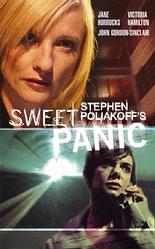Sweet Panic
Stephen Poliakoff's play "Sweet Panic" looks at the stresses and strains of modern life in London and describes the panic that we are meant to believe many people feel on a daily basis. Parents worry that their children are not performing well at school and may not acquire the necessary skills to be high-achievers. Their anxieties are not merely fuelled by concerns for their child's welfare but also over the constant pressure to be competent parents. Academics worry if their hours of studying esoteric subjects has any intrinsic value. People worry that the world is becoming unsafe, that civil society is collapsing, and that their job, and therefore their lives, are meaningless. However, it is the children who are apparently the real victims; smothered by anxious and over-protective parents they are taught to fear danger on every street corner. Constantly assessed and categorised they too feel the relentless pressure to perform well and so become increasingly defiant, anxious and prone to panic attacks. Such are the fantasies that fills the minds of individuals who find themselves at yet another counselling session, hoping that some professional will take responsibility for the decisions that they feel unqualified to make for themselves. This is the bleak world that Poliakoff explores in Sweet Panic.
Clare is a child psychologist who not only has to help the difficult and disturbed children who are sent to her as patients but also deal with the stressed parents who deliver their anxious off-spring to her office door. When one such parent, Mrs Trevel, learns that Clare is going to be away from town on a bank-holiday weekend she insists upon having Clare's mobile telephone number, which Clare refuses to give to her. When Mrs Trevel's son decides to 'run away' from home Mrs Trevel grows increasingly irate at her inability to contact Clare and so seeks revenge.
What particularly annoys Mrs Trevel, the self-confessed mother from hell, is the fact that Clare appears to be self-assured, competent and totally in charge of her life. Mrs Trevel feels inadequate in front of this proficient woman who claims to know more about her child then she does herself. The only thing that will now satisfy Trevel is to see Clare's confidence destroyed, and induce in her a similar state of panic.
Though this sounds like the bases for a good drama, sadly the play is riddled with defects. Why does Clare allow herself to be stalked by Trevel? Why not report her to the police instead of allowing this bizarre woman to burst into her office and disrupt her consultations? And why would she accept a lift from a woman who has vowed to destroy her and then follow her into a deserted underground car park? There are also other difficulties in the plot, such as when an ex patient turns up offering gifts and wishing to take Clare out for lunch so he can tell her how successful he has now become, Clare seems the last person to suspect that he is still a disturbed individual.
The concluding remarks of the play are far from reasonable. Who really believes that panic is good and that we should tell children that their future will always remain uncertain? Wanting constant assurances that everything in life will be well can indeed become a psychosis, as the character of Mrs Trevel proves all to well, but surely the alternative is not 'sweet' panic.
Jane Horrocks is superb as the tight-lipped, suppressed Mrs Trevel; she looks unpredictable and completely loopy, without resorting to histrionics and wild meaningless gestures. Victoria Hamilton is equally good as the warm, self-assured psychiatrist who gradually finds her professional certainties collapsing around her as her life becomes more and more chaotic.
As powerful as the acting is throughout this play the contrived plot that delivers no satisfactory conclusion leaves one feeling disappointed.
What other critics had to say.....
NICHOLAS DE JONGH for THE EVENING STANDARD says Jane Horrocks "is riveting in bizarre black comedy." PAUL TAYLOR for THE INDEPENDENT says the play is "captivating". MICHAEL BILLINGTON for THE GUARDIAN says, "Though it is quietly intriguing, there is still something distinctly odd about it." CHARLES SPENCER fro THE DAILY TELEGRAPH says, "Tantalising and infuriating." BENEDICT NIGHTINGALE for THE TIMES says, "I felt the tension and admired the droll." ALISTAIR MACAULAY for THE FINANCIAL TIMES says, "A charmingly 'textured' play."
External links to full reviews from newspapers
The Independent
The Guardian
Daily Telegraph
The Times
Financial Times
Originally published on
